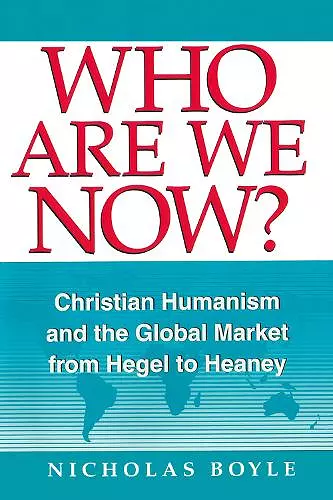Who Are We Now?
Christian Humanism and the Global Market from Hegel to Heaney
Format:Hardback
Publisher:University of Notre Dame Press
Published:18th Sep '11
Currently unavailable, and unfortunately no date known when it will be back

Along with the spectacular collapse in 1989 of the perspectives imposed by the Cold War, the false certainties of the national and imperial age which shaped our collective and individual identity fell away as well. As we try to regroup and redefine ourselves and our social bonds, we must take into account two seemingly contradictory forces: the trend toward diversity and pluralism, on the one hand, and the pull toward ever greater unification, on the other.
In this book, Nicholas Boyle offers ten studies of the implications of the increasingly integrated world economic structure for our sense of political, cultural, and personal identity. He argues for the deep interconnectedness of politics, religion, philosophy, and literature and their shared inseparability from the economic base. In the process, he uses philosophical and literary ideas to establish systematic grounds for optimism about an emerging supra-national order, aiming to restore the possibility of "grand narrative" to our collective past and future.
However, his exploration of the global mind does not ignore the many haunting personal questions raised by the upheaval of the 90s: Are we more than consumers and producers? To what extent do our nationhood, our gender, our religious and cultural affiliations still define us? Is a Christian perspective viable in such a secular world? Can literature and philosophy make sense of individual lives? What role will the intellectual class play?
Boyle takes a close look at Germany and Britain, their differences and growing similarity. He discusses, among others, Thatcher, Fukuyama, Hegel, Nietzsche, Heidegger, Derrida, and Seamus Heaney. Boyle asserts that as the world becomes less divided but more disparate, and its order less draconian but more precarious, choosing the paths most likely to lead to justice and peace will reform our shattered sense of identity.
“The journey from political paradoxes to Christian poetry that Boyle has unveiled is illuminating. [T]his is a book of extraoridinary substance for theologians interested in surviving postmodernity.” — Teaching Theology and Religion
“Boyle’s argument for a deep interconnectedness of politics, religion, philosophy and literature, and their shared inseparability from the economic base, is appealing. Boyle has produced a book full of perceptive insight and important challenge that deserves to be widely read.” —Theological Book Review
“[T]his book is one of the most challenging to theology that I have read in recent years. I recommend it without reservation as an excellent starting-point for what needs to be an essential part of the contemporary discussion.” —The Expository Times
“[A] Christian tract for our times in the best traditions of Newman, Chesterton, or T. S. Eliot. In Who Are We Now? Christian Humanism and the Global Market from Hegel to Heaney, Dr. Boyle analyses the revolutionary impact of globalisation, and he devotes several essays to explaining how we got here—as invisibly erudite a brief intellectual history of the West as I have ever read.” —The Times (London)
ISBN: 9780268010331
Dimensions: unknown
Weight: unknown
360 pages